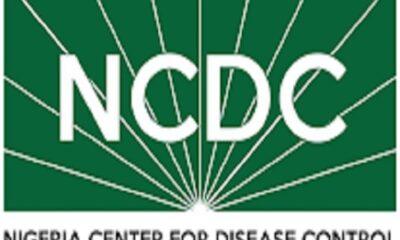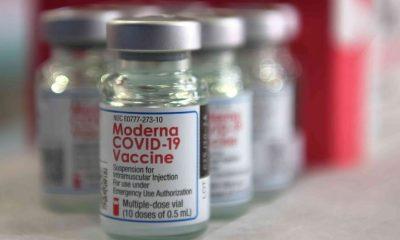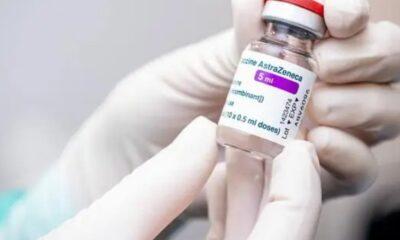Health
COVID-19: NCDC Says Patients To Be Discharged Without Testing Negative
Published
5 years agoon
By
Editor
The Nigeria Centre for Disease Control (NCDC) on Thursday June 4, said a negative laboratory test is no longer required to discharge a COVID-19 patient, as symptomatic patients will be discharged earlier than usual after they have stop showing symptoms of the disease – fever and respiratory symptoms).
Also, asymptomatic patients will now be discharge 14 days after their first positive test to the virus.
This is based on new data from Singapore that shows that RNA detected beyond 10 days is no longer infectious as no viable virus is grown by viral culture. Therefore, such patients will be discharged but advised to continue self-isolating at home one week after discharge.
READ ALSO: Corruption In NDDC: Clark Wants Constitution Of New Investigative Panel
The Director-General of the NCDC, Dr. Chikwe Ihekweazu, who made this known at the daily briefing of the Presidential Task Force on COVID-19, in Abuja, said: “There have been new science emerging about the duration of infectivity of individual patients. It led to the WHO issuing new clinical guidelines.
“We then convened colleagues across our organisation, the department of hospital services of the Federal Ministry of Health, as well as other colleagues with whom we work, to review our guidelines and issue new guidelines for the country and of course adapting it to local circumstances.
“The key thing is that the management of COVID-19 will be made primarily supportive; we don’t have any treatment so far that has any proven impact on morbidity.
“One of the major changes that have happened is the discharge criteria. While these guidelines are obviously and primarily targeted at physicians managing patients, it is important that patients and people know. There are two groups of patients – symptomatic and asymptomatic patients.
READ ALSO: Just In: Lightening Kills Artisan In Edo
“For symptomatic patients, they may now be discharged at least 10 days after symptoms onset and at least 3 days without symptoms. If your symptoms last for longer, we will wait for longer managing you supportively.
“If you are asymptomatic, you can be discharged 14 days after your first positive test. So, we no longer have to wait for a negative test to discharge. This way you can go home with confidence that you are no longer infective and you’re not putting your family and friends or anyone else at risk.
“We are not encouraging that people be discharged while they are still symptomatic. We are talking about discharging people that are asymptomatic and have recovered. That is, you are symptomatic and have recovered or you are completely asymptomatic throughout your clinical episodes”, he added
On the use and availability of personal protective equipment (PPEs), The NATION reports that the NCDC boss urged both public and private hospitals to procure their own PPEs and factor it into the cost for healthcare delivery.
He said, “Our hospitals both public and private, really need to include the purchasing of personal protective equipment in their procurement plans. These are things that they have to buy to keep their hospital going.
READ ALSO: Edo Guber: Drama As Journalists Barred From Covering Court Case Challenging Ize-Iyamu APC Membership
“What we are doing now is simply a response to an outbreak – managing logistics, sending around PPEs across the country. This is definitely not what we should be doing as a country. So, that has to change as we refigure our health system to include this.”
(NATION)
You may like


Brazil Star, Neymar Tests Positive For COVID-19


NCDC Records 1,307 Cholera Cases, 34 Deaths In 30 States


FG Tracks 1,277 Persons As Lassa Fever Kills 122


Over 1,300 Diphtheria Deaths Recorded As Vaccination Gaps Persist – NCDC


New Strain Of COVID Could Be Causing Strange Night-time Symptoms As Cases Spread


Why Some People Don’t Get Sick From COVID-19 Infection — Study
Health
LASG FLags Off Polio Outbreak Response Campaign
Published
6 months agoon
January 20, 2025By
Editor
The Lagos State Government, through the Lagos State Primary Health Care Board, has launched the 2025 Polio Outbreak Response Campaign, reaffirming its commitment to eradicating polio and safeguarding the health of its children.
The ceremony, held at the Simpson Primary Healthcare Centre, was led by the First Lady of Lagos State, Dr. (Mrs.) Claudiana Ibijoke Sanwo-Olu, represented by Mrs. Widad Jumoke Mustafa, a member of the Committee of Wives of Lagos State Officials (COWLSO).
In her address, the First Lady emphasised the state government’s proactive measures to keep Lagos polio-free, highlighting the critical importance of the campaign in preventing the debilitating effects of poliomyelitis, which can result in paralysis or death.
READ ALSO: IMPEACHMENT: Lagos Ex-Speaker, Obasa’s ‘Sins’ Revealed
The First Lady also called on parents, community leaders, and stakeholders to support the campaign by ensuring eligible children are vaccinated.
Targeting children aged 0-59 months, vaccination teams will administer the Oral Polio Vaccine (OPV) to prevent virus transmission.
Dr. Kemi Ogunyemi, the Special Adviser on Health, expressed gratitude to Lagosians for their continued cooperation in the fight against polio. While appreciating all healthcare workers and partners for their services, Mrs. Ogunyemi encouraged parents to present their children and wards for the exercise.
Also speaking, the Chairman of Lagos Mainland Local Government, Mrs. Omolola Rashidat Essien opined that Immunization is key in ensuring that children are kept safe from polio and other vaccine preventable diseases.
Dr. Abimbola Bowale, the Supervising Permanent Secretary, Lagos State Primary Health Care Board, who also spoke at the event, underscored the life-saving importance of immunization.
“All children aged 0-59 months need multiple doses of the polio vaccine to ensure full protection. Any child missed represents a potential risk for the poliovirus to spread. The vaccine is safe, effective, and crucial in keeping our communities polio-free,” he stated.
Dr. Bowale also outlined several strategies to ensure the success of the campaign, including fixed post teams stationed at primary healthcare centres and public health facilities, house-to-house visits, and a transit strategy to reach special locations such as places of worship, schools, motor parks, and other public venues.
The event concluded with Dr. (Mrs.) Claudiana Ibijoke Sanwo-Olu officially launched the campaign, marking a renewed effort to maintain Lagos State’s polio-free status.

The Lagos state suspected cholera cases have risen to 421.
The Commissioner for Health, Akin Abayomi disclosed this on his Instagram handle @profakinabayomi on Saturday.
“As of June 20, 2024, an additional four suspected cholera cases have been reported, as illustrated in the accompanying graph,” he wrote.
He noted that the Emergency Operations Centre in collaboration with all relevant partners is actively engaged in contact tracing, community-based surveillance, awareness campaigns, sample testing, and ensuring that confirmed cholera cases receive appropriate medical treatment.
READ ALSO: Two Suspects Arrested For Stealing Car From Mosque During Juma’at Prayer
On Friday, the commissioner confirmed 35 cases out of the 417 suspected cases and 24 deaths across 20 Local Government Areas in the state.
The cases were reported from Agege, Badagry, Ikeja, Mushin, Ajeromi-Ifelofun, Epe, Ikorodu, Ojo, Alimosho, and Eti-Osa.
Others were Kosofe, Oshodi-Isolo, Amuwo-Odofin, Ibeju-Lekki, Lagos Island, Shomolu, Apapa, Ifako-Ijaiye, Lagos mainland, and Surulere.
Cholera is a food and water-borne disease caused by ingesting the bacteria— Vibrio cholerae — in contaminated water and food. Cholera can cause severe acute watery diarrhoea, and the severe forms of the disease can kill within hours if left untreated.
In Nigeria, cholera is an endemic and seasonal disease, occurring annually mostly during the rainy season and more frequently in areas with poor sanitation.
READ ALSO: Police Arrest 28yr Old Suspected Cultists, Recover Gun In Delta Community
The World Health Organisation on Thursday announced a spike in cholera in several regions of the world, with almost 195,000 cases and over 1,900 deaths reported in 24 countries since the start of 2024.
WHO said the Eastern Mediterranean Region reported the highest number of cases, followed by the African Region, the Region of the Americas, the Southeast Asia Region, and the European Region.
The global health body, however, noted that there are no reported cases in the Western Region, according to its bulletin released on Wednesday.
It said it exhausted its global stockpile of Oral Cholera Vaccines by March but was able to exceed “the emergency target of five million doses in early June for the first time in 2024.”

By Silver Yeibake
Autism, commonly known as Autism Spectrum Disorder (ASD), is a neurodevelopmental disorder that affects communication, social interaction, and behavior. Autism is referred to as a spectrum condition since it can manifest in a variety of symptoms and abilities. While the actual cause of autism is unknown, evidence suggests that genetic and environmental factors interact to influence its development.
The risk factors include a sibling with autism, advanced age of parents, exposure to certain air pollutants and pesticides before birth, extreme prematurity, mothers with diabetes, immune system disorders or obesity, any difficulty with delivery leading to deprivation of oxygen to the baby’s brain, fever during pregnancy, lack of certain vitamins minerals during pregnancy, and certain genetic conditions, such as Down, fragile X, and Rett syndromes.
“Risk factors can not on their own cause a disease. However, they can increase the likelihood of that disease in a person.”
It is important to know that contrary to trending claims online, there is no scientific or medical evidence that vaccines or consumption of sugar are risk factors for autism.
READ ALSO: Kidney Stones: What You Need To Know
Autism is defined by difficulties in social interaction and communication. Individuals with autism may struggle to grasp social cues, maintain eye contact, and engage in typical back-and-forth conversations. Some people may also engage in meaningless, repetitive actions, such as hand-flapping or rocking, and have strong interests in specific areas.
It is essential to remember that autism is a lifelong diagnosis, but with early intervention and adequate care, people with autism can live fulfilling lives.
Autism treatment frequently includes behavioral therapy, speech therapy, occupational therapy, and social skills training. Each individual with autism is unique, thus interventions should be tailored to meet their personal needs and strengths.
In spite of the difficulties that autism can cause, many people with autism possess unique talents and abilities. Some people may succeed in fields such as music, art, mathematics, or programming, thus it is important for society to acknowledge and honor the qualities and achievements of people with autism.
In summary, autism is a complicated and diverse disorder that affects individuals in various ways. By raising autism knowledge, understanding, and acceptance, we can build a more inclusive society in which people with autism can thrive and attain their full potential.
Dr. Yeibake, Weriwoyingipre Silver.
Senior Registrar,
Faculty Of Pediatrics,
WACP
- Osun Monarchs Donate Air-conditioners, Computers To Support NUJ’s E-Library Project
- Man Seeks End Of 16 Years Wedlock For Lack Of Love
- Coalition: Why Tinubu Must Not Sleep —Primate Ayodele
- My Wife Goes Clubbing At Will, Cares Less That She’s Childless, Man Tells Court
- I Ran For My Dear Life After My Wife Threatened To Bathe Me With Acid — Husband
- My Husband Leaves Home Whenever We Have Misunderstanding, Woman Tells Court
- 2Face Controversy: Family, Friends Speak Out Amid Apology Backlash
- Burna Boy Turns 34, Reveals Plans To Start A Family
- Cultism: Edo Police Arrest Suspected Killer Of Three Vigilantes, 15 Others
- My Wife Abandoned Me, Deserted Home For Three Months —Husband
About Us
Trending

 Sports2 days ago
Sports2 days agoBREAKING: Liverpool Star Diogo Jota Is Dead

 News4 days ago
News4 days agoSenator Withdraws From Legislative Duties Over Health Challenge

 Politics4 days ago
Politics4 days agoINEC Unveils 2025-2026 Election Timetable, Resumes Voter Registration

 Headline4 days ago
Headline4 days agoUS-based Lawyer Becomes First Nigerian To Travel To Space

 Politics3 days ago
Politics3 days agoEdo: S’Court Reserves Verdict On Ighodalo’s Case Against Okpebholo

 Headline4 days ago
Headline4 days agoTelevangelist, Jimmy Swaggart, Is Dead

 Metro4 days ago
Metro4 days agoCleric Jailed 53 years For Sexually Assaulting 14-year-old Daughter

 Metro3 days ago
Metro3 days agoControversy Over Pregnant Woman Buried Alive In Edo

 Headline3 days ago
Headline3 days agoAU Helicopter Crashes In Somali Capital – State Media

 News4 days ago
News4 days agoCAC Unveils AI-powered Portal For 30-minute Company Registrations



























